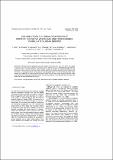Age and cross-cultural comparison of drivers' cognitive workload and performance in simulated urban driving
Author(s)
Son, J.; Reimer, Bryan; Mehler, Bruce L.; Pohlmeyer, A. E.; Godfrey, K. M.; Orszulak, Jarrod Joseph; Long, J.; Kim, M. H.; Lee, Y. T.; Coughlin, Joseph F; ... Show more Show less
DownloadReimer_Age and.pdf (193.3Kb)
PUBLISHER_POLICY
Publisher Policy
Article is made available in accordance with the publisher's policy and may be subject to US copyright law. Please refer to the publisher's site for terms of use.
Terms of use
Metadata
Show full item recordAbstract
Driving demands significant psychomotor attention and requires even more when drivers are engaged in secondary tasks that increase cognitive workload and divert attention. It is well established that age influences driving risk. Less is known about how culture impacts changes in attention. We conducted parallel driving simulations in the US and Korea to measure the extent to which age and culture influence dual-task performance. There were 135 participants divided into two groups: a younger group aged 20∼29, and an older group aged 60∼69. Whereas some differences by culture appeared in absolute control measures, the younger participants showed similar mean velocity and compensatory patterns associated with increased cognitive load in the urban setting; however, the results from the older samples were less similar.
Date issued
2010-08Department
Massachusetts Institute of Technology. Center for Transportation & Logistics; AgeLab (Massachusetts Institute of Technology)Journal
International Journal of Automotive Technology
Publisher
Springer Science + Business Media B.V.
Citation
Son, J. et al. “Age and cross-cultural comparison of drivers’ cognitive workload and performance in simulated urban driving.” International Journal of Automotive Technology 11 (2010): 533-539.
Version: Author's final manuscript
ISSN
1976-3832
1229-9138